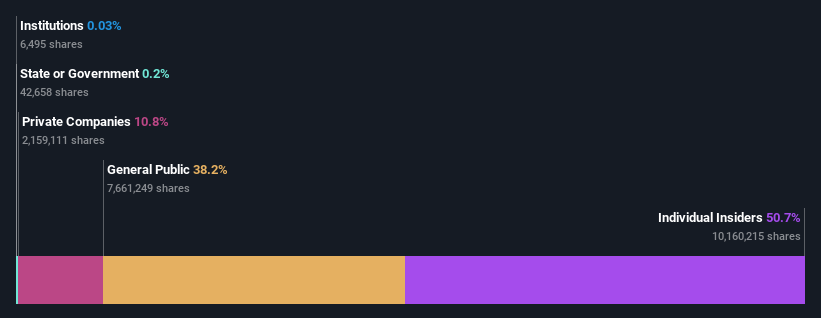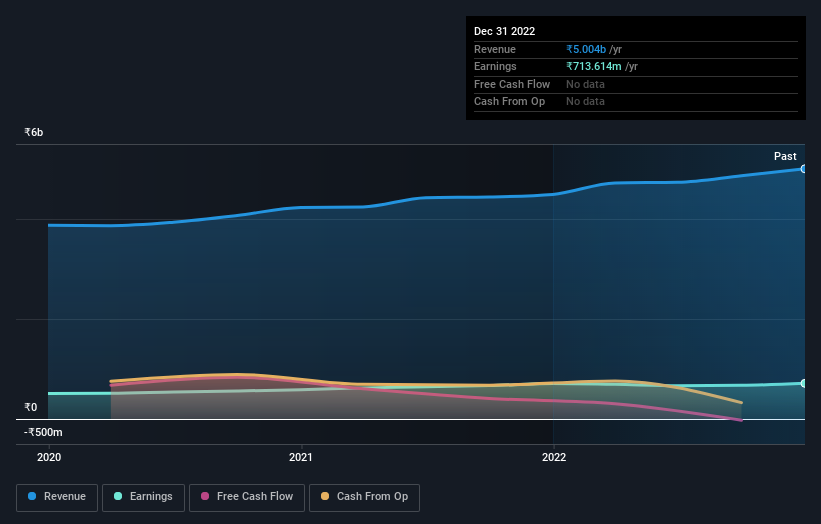Great week for Lincoln Pharmaceuticals Limited (NSE:LINCOLN) insiders who have 51% stake and they haven’t stopped buying

Key Insights
- Insiders appear to have a vested interest in Lincoln Pharmaceuticals' growth, as seen by their sizeable ownership
- 50% of the business is held by the top 14 shareholders
- Insiders have been buying lately
If you want to know who really controls Lincoln Pharmaceuticals Limited (NSE:LINCOLN), then you'll have to look at the makeup of its share registry. With 51% stake, individual insiders possess the maximum shares in the company. That is, the group stands to benefit the most if the stock rises (or lose the most if there is a downturn).
Having purchased shares recently, insiders must be glad after market cap hit ₹8.9b last week.
Let's take a closer look to see what the different types of shareholders can tell us about Lincoln Pharmaceuticals.
See our latest analysis for Lincoln Pharmaceuticals

What Does The Lack Of Institutional Ownership Tell Us About Lincoln Pharmaceuticals?
Small companies that are not very actively traded often lack institutional investors, but it's less common to see large companies without them.
There are multiple explanations for why institutions don't own a stock. The most common is that the company is too small relative to funds under management, so the institution does not bother to look closely at the company. Alternatively, there might be something about the company that has kept institutional investors away. Lincoln Pharmaceuticals' earnings and revenue track record (below) may not be compelling to institutional investors -- or they simply might not have looked at the business closely.

Lincoln Pharmaceuticals is not owned by hedge funds. Our data suggests that Munjal Patel, who is also the company's Senior Key Executive, holds the most number of shares at 11%. When an insider holds a sizeable amount of a company's stock, investors consider it as a positive sign because it suggests that insiders are willing to have their wealth tied up in the future of the company. Meanwhile, the second and third largest shareholders, hold 7.5% and 7.2%, of the shares outstanding, respectively. Interestingly, the second and third-largest shareholders also happen to be the Head of Sales and Member of the Board of Directors, respectively. This once again signifies considerable insider ownership amongst the company's top shareholders.
Looking at the shareholder registry, we can see that 50% of the ownership is controlled by the top 14 shareholders, meaning that no single shareholder has a majority interest in the ownership.
While it makes sense to study institutional ownership data for a company, it also makes sense to study analyst sentiments to know which way the wind is blowing. As far as we can tell there isn't analyst coverage of the company, so it is probably flying under the radar.
Insider Ownership Of Lincoln Pharmaceuticals
While the precise definition of an insider can be subjective, almost everyone considers board members to be insiders. The company management answer to the board and the latter should represent the interests of shareholders. Notably, sometimes top-level managers are on the board themselves.
Most consider insider ownership a positive because it can indicate the board is well aligned with other shareholders. However, on some occasions too much power is concentrated within this group.
Our information suggests that insiders own more than half of Lincoln Pharmaceuticals Limited. This gives them effective control of the company. That means they own ₹4.5b worth of shares in the ₹8.9b company. That's quite meaningful. Most would be pleased to see the board is investing alongside them. You may wish todiscover (for free) if they have been buying or selling.
General Public Ownership
With a 38% ownership, the general public, mostly comprising of individual investors, have some degree of sway over Lincoln Pharmaceuticals. While this size of ownership may not be enough to sway a policy decision in their favour, they can still make a collective impact on company policies.
Private Company Ownership
It seems that Private Companies own 11%, of the Lincoln Pharmaceuticals stock. Private companies may be related parties. Sometimes insiders have an interest in a public company through a holding in a private company, rather than in their own capacity as an individual. While it's hard to draw any broad stroke conclusions, it is worth noting as an area for further research.
Next Steps:
It's always worth thinking about the different groups who own shares in a company. But to understand Lincoln Pharmaceuticals better, we need to consider many other factors.
I like to dive deeper into how a company has performed in the past. You can find historic revenue and earnings in this detailed graph.
Of course this may not be the best stock to buy. Therefore, you may wish to see our free collection of interesting prospects boasting favorable financials.
NB: Figures in this article are calculated using data from the last twelve months, which refer to the 12-month period ending on the last date of the month the financial statement is dated. This may not be consistent with full year annual report figures.
New: AI Stock Screener & Alerts
Our new AI Stock Screener scans the market every day to uncover opportunities.
• Dividend Powerhouses (3%+ Yield)
• Undervalued Small Caps with Insider Buying
• High growth Tech and AI Companies
Or build your own from over 50 metrics.
Have feedback on this article? Concerned about the content? Get in touch with us directly. Alternatively, email editorial-team (at) simplywallst.com.
This article by Simply Wall St is general in nature. We provide commentary based on historical data and analyst forecasts only using an unbiased methodology and our articles are not intended to be financial advice. It does not constitute a recommendation to buy or sell any stock, and does not take account of your objectives, or your financial situation. We aim to bring you long-term focused analysis driven by fundamental data. Note that our analysis may not factor in the latest price-sensitive company announcements or qualitative material. Simply Wall St has no position in any stocks mentioned.
About NSEI:LINCOLN
Lincoln Pharmaceuticals
Engages in manufacturing and trading of pharmaceutical products in India.
Flawless balance sheet established dividend payer.
Similar Companies
Market Insights
Community Narratives




